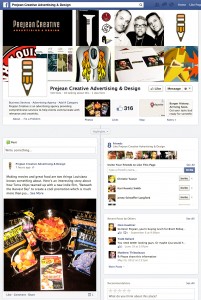 When the decision is made to advertise their goods or services, most local businesses wouldn’t think of renting a video camera and studio and producing their own TV commercials. (At least, we hope not.) However, if they decide they’re Steven Spielberg and do it themselves, the results are predictably bad.
When the decision is made to advertise their goods or services, most local businesses wouldn’t think of renting a video camera and studio and producing their own TV commercials. (At least, we hope not.) However, if they decide they’re Steven Spielberg and do it themselves, the results are predictably bad.
We’ve all seen the poorly lit, poorly written local spots which feature the hyperventilating owner of the business screaming at us to “come on down!” It’s not pretty and it actually does more harm than good for the company trying to save a few bucks on production. Even a small company should budget for some degree of assistance from a professional ad agency or, at the very least, should seek out a reputable video or audio production company for these spots.
However, when it comes to social media such as Facebook, Twitter, YouTube or Pinterest, most small-businesses owners delegate this marketing task to someone in-house who has no training or worse – they try and do it themselves. If a recent survey is accurate, these over-worked entrepreneurs don’t WANT to manage social media, they just feel they have no alternative.
A Survey of Small Businesses
According to a June 2013 survey conducted by the well-known email service Constant Contact, small business owners would like help managing their social media marketing but many feel they cannot afford it. The survey of 1,305 small-business owners found that in terms of marketing priorities, social media loses out to more established local advertising media such as radio and television.
The results showed 19 percent of the small-business owners would like to outsource social media, but only 3 percent are actually able to do so. This compares to 40 percent who outsource TV and radio ads, 35 percent who outsource search engine optimization, 23 percent who outsource banner ads, 22 percent who outsource their website management and 20 percent who outsource local print advertising.
A previous survey by Constant Contact found that 80 percent of small-business owners are using social media marketing and more than half of this group said it’s the marketing activity they need the most help with. So what? Who really cares whether small business makes it or not? Actually, we should all be rooting for the home team – local small businesses –and here’s why.
Is Small Business Really Important?
According to Entrepreneur magazine, there are between 25 million and 27 million small businesses in the U.S. and they account for 60 to 80 percent of all jobs in this country. That is an amazing statistic. It means the investments, revenue and payrolls of small businesses dramatically affect every other sector of the economy.
Small businesses are also important for new product development. A study by the payroll company “Paychex” says small businesses produce 13 times more patents than larger firms. Anyone who starts and runs a small business intuitively understands this phenomenon. When you’re small and scrappy, you have to innovate or perish. Bill Hewlett and Dave Packard started their enormously successful electronics company as the smallest of businesses in a one-car garage in Palo Alto, California.
 Social Media and Small Business
Social Media and Small Business
You may have heard the “long tail of the Internet” has changed everything for small businesses. This phrase, coined by Wired Magazine editor Chris Anderson, means that huge inventories (and capital investment) are no longer needed because products and parts – even the most specialized – needed by small businesses, are quickly available on a just-in-time basis. This “long tail” is also in evidence with social media as it is used to find new customers.
Well-known marketing guru, Seth Godin noted in his blog that there have been 3 types of businesses in history. The “geography-based” business (think McDonald’s) is real-estate driven – the business must be in the right place to succeed. The “commodity-based” business is successful when it sells a wide range of commodities that are priced cheaper than anyone else. The third type is the “community-based” business. It’s the most difficult to build, but is the most stable after its built.
Godin notes, “Community-based businesses tell stories. They create remarkable products. They sync up their tribe. They happily surrender market share to commodity sellers – if it’s a lower price you want, good luck to you.” This community-based business model is overwhelmingly used by small business and it lives and breathes on social marketing.
Social media such as Twitter, Facebook, LinkedIn, YouTube, Yelp and any number of others are all highly personalized media which motivate and inspire new customers to try a small-business product. This means a positive or a negative opinion, review or offhanded remark can exponentially spread – almost immediately – by a social network.
This is a very powerful tool – for both good and harm – and should not be handled by the part-time teenager who comes in on Thursday to run errands. Having the owner of the business manage the social media is also a problem because it requires expertise and time in order to understand the mechanisms and keep current on the subject-matter of the network. Time is precious to a small-business owner .
Want proof of how quickly social network marketing can change? In just one week, September 16 – 22, 2013, the newsletter Social Media Examiner noted the following changes:
- Pinterest to test promoted pins – This might have dramatic impact on companies that sell female-oriented products and services.
- Facebook tests an easier way to watch videos – The largest social network on the planet is tinkering with video posts and this could impact companies with video-centric messages or products.
- Facebook redesigns mobile app – Customers are accessing the web and social network via mobile, and Facebook is adapting to the new iOS 7.
- Twitter introduces a new mobile app – See Facebook above
- Tumblr adds push notifications – blogging is a great way to build customer engagement and sales and Tumblr is an excellent platform.
These changes happened in one week. Imagine how radically these media change in a month or a quarter.

Get Started
If you own or run a small business, you must surely feel that the odds are stacked against you. Well, you’re right. They are. However, getting better at something as seemingly complicated as social media marketing can change those odds.
Social media marketing is the perfect tool for small business guerilla marketing and with a little investment, big returns in the form of customer engagement and sales are possible. Here are eight simple things you can do today to improve your social network marketing.
- Realize that kids move on to the next shiny object LONG before you do and this is especially true for social networks. Unless you have a product or service that is designed for teenagers or college-aged kids, don’t base your decision on which social nets to use on them. Talk to your target audience. What social networks do they use?
- Sit down with your team and decide three objectives for your social media marketing. This is more difficult than it sounds, but it’s a critical step. If you don’t know where you’re going, any road will get you there. When you decide these objectives, write them down and base your planning on them.
- Customer engagement for business-to-business products and services are better made on LinkedIn or YouTube than Facebook. Invest 10 minutes in starting a LinkedIn page, join a few groups that are focused on your industry and begin posting information and articles that you would find interesting. Dividends will occur when other businesses see your posts and put you on their mental “short list.”
- Because of its huge base, Facebook and Twitter are great for consumer products and services. Facebook has recently changed its policy for consumer contests and these new rules allow for a wide range of free promotions which can ultimately drive revenue. Consult an expert on social marketing or spend some time looking over the guidelines from Facebook.
- Don’t think of social media in the traditional sense of other media. It’s not just another megaphone for you to broadcast your weekly deals and specials (although this “deal offering” promotion can be a part of a social media strategy). It is a way for you to ask questions and engage your customers, make them into friends and then share news about your business with these new friends. If your social site is only about those things your business has on sale, it will attract some bargain shoppers but it will not help you build and engage a community for the long haul.
- Begin reading the best social network marketing newsletters. A good one is the one noted above – Social Media Examiner and Convince & Convert. Both are free.
- Join local social media organizations where you can freely discuss your situation and get others in the group to offer suggestions.
- Ask a social media consultant or advertising agency which handles social media marketing for an estimate (hourly or project basis) in evaluating your current social network strategy, design of pages, objectives and tactics. They can train someone on your team to use effective social tactics. You will likely be surprised by the return on this investment.
What’s Your Social Network Marketing Costing You?
There are literally thousands of other tactics which can be used by small businesses to get a good return on investment from social marketing. It starts with a commitment of the owner or management of the company and that usually involves the allocation of resources.
In the Constant Contact survey noted at the outset of this discussion, small-business owners were asked to calculate the value of an hour of their own labor. The average rate the owners returned was $273 per hour. If you own a small business, how much money would you save by having an expert handle your social network marketing, or training a member of your team to do so? How much revenue would be generated if you handed off the social marketing duties to someone who knows the difference between a LIKE and a Tweet and has the time to take advantage of this knowledge?
Do you have questions about social media? Shoot us an email or give us a call.

